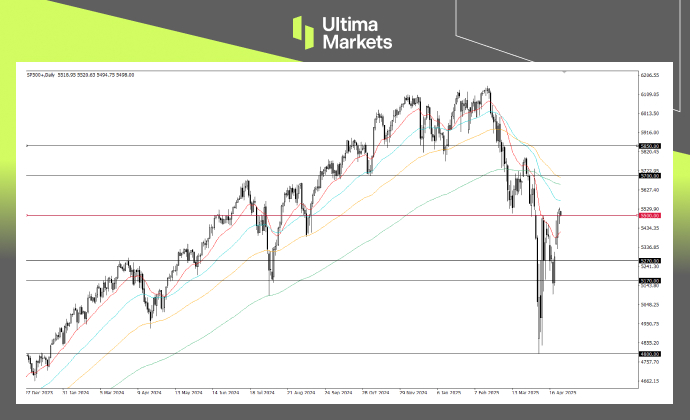Earnings Boost Optimism, U.S. Economic Data in Focus
TOPICSMajor U.S. stock indices posted strong weekly gains last week, fueled by better-than-expected earnings from several big companies. Notably, Alphabet’s (NASDAQ: GOOGL) results renewed optimism around artificial intelligence, helping extend the rally in the tech sector.
Investor sentiment drove the three major U.S. indices higher, with the S&P 500 and Dow Jones rising 4.6% and 2.5% respectively. Meanwhile, the tech-heavy NASDAQ surged 6.7%, climbing back above the 19,000 marks.
US-China Trade Confusion: Mixed Messages Shake Investor Confidence
Recent comments from U.S. officials have caused confusion about the status of US-China trade talks. U.S. Treasury Secretary Scott Bessent stated that he was unaware of any ongoing tariff talks with China, contradicting President Trump’s earlier remarks, in which he claimed to have spoken recently with Chinese President Xi Jinping.
The Trump administration had shown signs of wanting to ease tensions in the trade war, which has already caused market instability and raised concerns about a global recession.
However, China’s denial of any talks has cast doubt on the U.S. side of the story, leaving investors uncertain about the future direction of the trade dispute.
U.S. Economic Data in Focus
This week, the U.S. is set to release several key economic reports, including the preliminary Q1 GDP, the March PCE Price Index (the Fed’s preferred measure of inflation), and key data for April’s labor market, including the unemployment rate and Non-Farm Payrolls.
The April employment data is especially important, as it will provide insights into how the U.S. economy may perform following the rollout of Trump’s tariffs in April.
With ongoing trade war uncertainty, investors will be closely watching how tariffs could impact the U.S. economy. The U.S. stock market has seen a strong rally in the past two weeks, driven in part by Trump pausing reciprocal tariffs and strong Q1 earnings reports.
However, these earnings reflect Q1 results, before the tariffs took effect. As a result, investor confidence could be shaken if upcoming economic data is disappointing, especially given the current uncertainty surrounding trade talks.
Will April Jobs Data Reflect Tariff Fallout?
Labor market data is a key indicator in gauging economic performance, and the April Non-Farm Payrolls and unemployment rate are particularly important for investors. The April labor market data will provide insight into how the tariffs have impacted the real economy.
The U.S. stock market is likely to react strongly if the job market shows significant deterioration.

(SP500+, Day-Chart Analysis; Source: Ultima Market MT5)
The S&P 500 is currently rising towards the key 5500 resistance level. Despite the recent upward movement, the index remains below its bearish territory. As a result, the S&P 500 could still experience a renewed downtrend if the job data comes in disappointing. This would raise concerns about how tariffs could truly impact the U.S. economy and the stock market.
Disclaimer
Comments, news, research, analysis, price, and all information contained in the article only serve as general information for readers and do not suggest any advice. Ultima Markets has taken reasonable measures to provide up-to-date information, but cannot guarantee accuracy, and may modify without notice. Ultima Markets will not be responsible for any loss incurred due to the application of the information provided.
Why Trade Metals & Commodities with Ultima Markets?
Ultima Markets provides the foremost competitive cost and exchange environment for prevalent commodities worldwide.
Start TradingMonitoring the market on the go
Markets are susceptible to changes in supply and demand
Attractive to investors only interested in price speculation
Deep and diverse liquidity with no hidden fees
No dealing desk and no requotes
Fast execution via Equinix NY4 server









